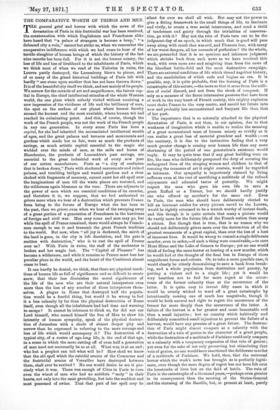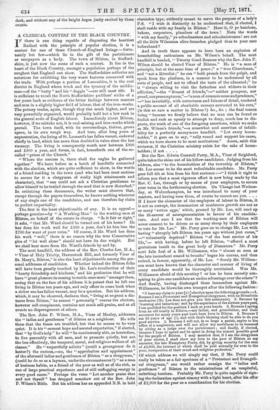THE COMPARATIVE WORTH OF THINGS AND MEN.
THE general grief and horror with which the news of the devastation of Paris in this fratricidal war has been received, the consternation with which Englishmen and Frenchmen alike have heard that "a palace of strangers is become a heap," "a defenced city a ruin," cannot but strike us, when we remember the comparative indifference with which we had come to hear of the terrific slaughter of human beings of which the history of the last nine months has been full. For it is not the human misery, the loss of life and loss of livelihood to the inhabitants of Paris, which we think most of when we read of the Tuileries in ruins, the Louvre partly destroyed, the Luxemburg blown to pieces, and of so many of the grand historical buildings of Paris left with hardly "one stone upon another that has not been thrown down." It is of the beautiful city itself we think, and not mainly of its people. We sorrow for the miracle of art and magnificence, the fairest cap- ital in Europe, the chief intellectual stimulus of the whole Western world, the one place which nobody visited without receiving a new impression of the vividness of life and the brilliancy of man, the spot on the surface of our planet where human faculty seemed the keenest and the most available, where human wit had reached its culminating point. And this, of course, though the work of the French people, was not the work of the French people in any one generation. In every sense Paris has been a capital, for she had inherited the accumulated intellectual wealth of ages, and the great palaces and terraces and monuments and gardens which made her so fair, were as much the products of savings, as much artistic capital essential to the magic she wielded over the minds of men, as the mills and looms of Manchester, the products of Lancashire's past savings, are essential to the great industrial work of every new year of our cotton manufacture. Paris as "a city of confusion that is broken down," Paris with shattered monuments and ruined palaces, and tumbling bridges and wasted gardens and a river choked with fragments of masonry, cannot exert her old spell over the imaginations of men till the waste places are restored, and the wilderness again blossoms as the rose. There are adjuncts to the power of men which are essential conditions of its exercise, and therefore it is, we suppose, that we feel authorized to grieve more when we hear of a destruction which prevents France from being to the future of Europe what she has been to the past, than we grieve even when we hear of the sweeping away of a great portion of a generation of Frenchmen in the hurricane of foreign and civil war. Men may come and men may go, but while the spell of France remained, there would always be French- men enough to use it and transmit the great French tradition to the world. But now, when "all joy is darkened, the mirth of the land is gone, in the city is left desolation, and the gate is smitten with destruction," who is to cast the spell of France over us? With Paris in ruins, the staff of the enchanter is broken and her magic lost. The "Capital of Pleasure" has become a wilderness, and while it remains so France must lose her peculiar place in the world, and the heart of the Continent almost cease to beat.
It can hardly be denied, we think, that there are physical condi- tions of human life so full of significance and so difficult to create anew, that their loss diminishes the moral significance of the life of the men who are their natural interpreters even more than the loss of any number of those interpreters them- selves. A plague in Rome that destroyed half the popula- tion would be a fearful thing, but would it be wrong to feel it a less calamity by far than the physical destruction of Rome itself, even though all the inhabitants had had time and warning to escape? It cannot be inhuman to think so, for did not our Lord himself, who named himself the Son of Man to show his intensity of human sympathy, speak of the physical destruc- tion of Jerusalem with a shade of almost deeper pity and sorrow than he expressed in referring to the mere carnage and loss of life which would accompany it ? The destruction of a typical city, of a centre of age-long life, is the end of that age, in a sense in which the mere cutting off of even half a generation of men need not necessarily be so at all. What was, is at an end ; who but a prophet can tell what will be ? How shall we know that the old spell which the suicidal armies of the Commune and the fratricidal armies of Versailles have destroyed between them, shall ever be revived ? No one would desire to see it pre- cisely what it was. There was enough of Circe in Paris to turn even the wisest of men who had no antidote " moly " in their hearts, not only into the most grovelling, but into the maddest and most possessed of swine. That that part of her spell may be
silent for ever we shall all wish. But may not the power to give a fitting framework to the small things of life, to fascinate and vivify, to create a true social intercourse, and send a thrill of tenderness and gaiety through the trivialities of conversa- tion, go with it ? May not the ruin of Paris turn out to be the judgment-day of an epoch, in which much that is good will pass away along with much that was evil, and Pleasure lose, with many of her worst dangers, all her counsels of perfection? On the whole, we are persuaded that it is no spurious and inhuman judgment which shrinks back from such news as we have received this week, with even more awe and misgiving than from the news of the bloodiest battle-field and the most destructive campaign. There are external conditions of life which thread together history, and the annihilation of which ends and begins an era. It is possible, nay, it is quite probable, that the burning of Paris is a catastrophe of this nature,—the more so that it arose from the colli- sion of social discord, and not from the shock of conquest. If only as a measure of the fierce internecine passions that have been at work in the very heart of French society, this mighty explosion must shake France to the very centre, and mould her future into new and probably less unconstrained and buoyant life than that of her past.
The importance that is so naturally attached to the physical devastation of Paris, is not then, in our opinion, due to that weakness of imagination which is unable to realize the meaning of a great accumulated mass of human misery so vividly as it can realize a great loss of material grandeur and wealth ;—on the contrary, it is due to the instinctive feeling that a very much greater change is coming over human life than any mere shortening of the period of one generation's existence would imply. It may be quite true that if any great building were on fire, the man who deliberately postponed the duty of securing the endangered lives of the sleeping women and children to that of rescuing the treasures of art it might contain, would be regarded as inhuman. Our sympathy is imperiously claimed by living sufferers even at the cost of sacrificing a multitude of the refined enjoyments and educated tastes of posterity. We might respect the man who gave his own life to save a great Raffael or a Turner, but we should hardly justify one who offered up another's for the same end. Even in Paris, the man who should have deliberately elected to kill an innocent soldier for every picture saved to the Louvre, would be rightly esteemed to be a wretch worthy of instant death, and this though it is quite certain that many a picture would do vastly more for the future life of the French nation than many a citizen. But though that is true, that is no reason why we should not deliberately grieve more over the destruction of all the greatest ornaments of a great capital, than over the loss of a host of innocent lives. It would be wrong to commit a single deliberate murder, even in order,—if such a thing were conceivable,—to save Mont Blanc and the Lake of Geneva to Europe ; yet no one would think of feeling the same horror at hearing of a new murder, which he would feel at the thought of the final loss to Europe of those magnificent forms and colours. Or, to take a more possible case, it would clearly be utterly demoralizing to save a bank from break- ing, and a whole population from destitution and penury, by putting a violent end to a single life ; yet it would be very heartless not to feel far more regret at the occur- rence of the former calamity than at the occurrence of the latter. It is quite easy to invent fifty cases in which it would be utterly wicked to ward off a great catastrophe by intentionally causing one of much leas magnitude, though it would be both natural and right to regret the occurrence of the former far more deeply than the occurrence of the latter. A failure of the harvest is a far greater and more lamentable evil than a small injustice ; but no country which habitually and deliberately committed small injustices to prevent the failure of a harvest, would have any promise of a great future. The destruc- tion of Paris might almost compare as a calamity with the destruction of a vein of genius in the character of a great people, while the destruction of a multitude of Parisians could only compare
as a calamity with a temporary suspension of that vein of genius ; yet even for the sake of not only preserving but stimulating that vein of genius, no one would have sanctioned the deliberate murder of a multitude of Parisians. We hold, then, that the universal horror which the week's news has brought us is perfectly legiti- mate, even though the same degree of regret has not been felt over the hecatombs of lives lost on the field of battle. The ruin of Paris is the catastrophe of a thousand years,—perhaps even greater
in its consequences than the meeting of the States-General and the storming of the Bastille, but, at present at least, purely
dark, and without any of the bright hopes justly excited by those events.



































 Previous page
Previous page